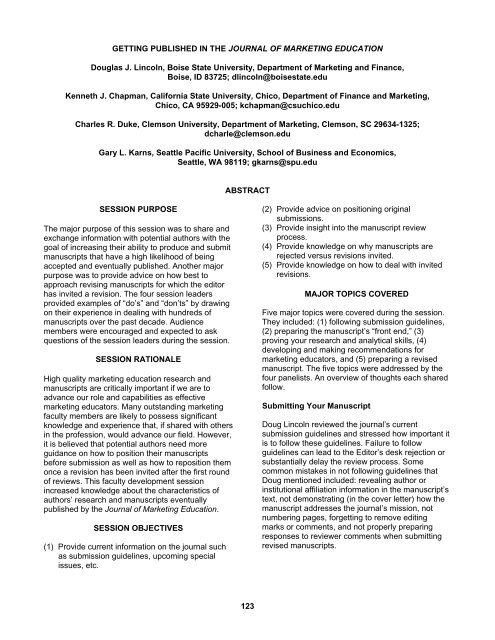2008 - Marketing Educators' Association
2008 - Marketing Educators' Association
2008 - Marketing Educators' Association
Create successful ePaper yourself
Turn your PDF publications into a flip-book with our unique Google optimized e-Paper software.
GETTING PUBLISHED IN THE JOURNAL OF MARKETING EDUCATION<br />
Douglas J. Lincoln, Boise State University, Department of <strong>Marketing</strong> and Finance,<br />
Boise, ID 83725; dlincoln@boisestate.edu<br />
Kenneth J. Chapman, California State University, Chico, Department of Finance and <strong>Marketing</strong>,<br />
Chico, CA 95929-005; kchapman@csuchico.edu<br />
Charles R. Duke, Clemson University, Department of <strong>Marketing</strong>, Clemson, SC 29634-1325;<br />
dcharle@clemson.edu<br />
Gary L. Karns, Seattle Pacific University, School of Business and Economics,<br />
Seattle, WA 98119; gkarns@spu.edu<br />
SESSION PURPOSE<br />
The major purpose of this session was to share and<br />
exchange information with potential authors with the<br />
goal of increasing their ability to produce and submit<br />
manuscripts that have a high likelihood of being<br />
accepted and eventually published. Another major<br />
purpose was to provide advice on how best to<br />
approach revising manuscripts for which the editor<br />
has invited a revision. The four session leaders<br />
provided examples of “do’s” and “don’ts” by drawing<br />
on their experience in dealing with hundreds of<br />
manuscripts over the past decade. Audience<br />
members were encouraged and expected to ask<br />
questions of the session leaders during the session.<br />
SESSION RATIONALE<br />
High quality marketing education research and<br />
manuscripts are critically important if we are to<br />
advance our role and capabilities as effective<br />
marketing educators. Many outstanding marketing<br />
faculty members are likely to possess significant<br />
knowledge and experience that, if shared with others<br />
in the profession, would advance our field. However,<br />
it is believed that potential authors need more<br />
guidance on how to position their manuscripts<br />
before submission as well as how to reposition them<br />
once a revision has been invited after the first round<br />
of reviews. This faculty development session<br />
increased knowledge about the characteristics of<br />
authors’ research and manuscripts eventually<br />
published by the Journal of <strong>Marketing</strong> Education.<br />
SESSION OBJECTIVES<br />
(1) Provide current information on the journal such<br />
as submission guidelines, upcoming special<br />
issues, etc.<br />
ABSTRACT<br />
123<br />
(2) Provide advice on positioning original<br />
submissions.<br />
(3) Provide insight into the manuscript review<br />
process.<br />
(4) Provide knowledge on why manuscripts are<br />
rejected versus revisions invited.<br />
(5) Provide knowledge on how to deal with invited<br />
revisions.<br />
MAJOR TOPICS COVERED<br />
Five major topics were covered during the session.<br />
They included: (1) following submission guidelines,<br />
(2) preparing the manuscript’s “front end,” (3)<br />
proving your research and analytical skills, (4)<br />
developing and making recommendations for<br />
marketing educators, and (5) preparing a revised<br />
manuscript. The five topics were addressed by the<br />
four panelists. An overview of thoughts each shared<br />
follow.<br />
Submitting Your Manuscript<br />
Doug Lincoln reviewed the journal’s current<br />
submission guidelines and stressed how important it<br />
is to follow these guidelines. Failure to follow<br />
guidelines can lead to the Editor’s desk rejection or<br />
substantially delay the review process. Some<br />
common mistakes in not following guidelines that<br />
Doug mentioned included: revealing author or<br />
institutional affiliation information in the manuscript’s<br />
text, not demonstrating (in the cover letter) how the<br />
manuscript addresses the journal’s mission, not<br />
numbering pages, forgetting to remove editing<br />
marks or comments, and not properly preparing<br />
responses to reviewer comments when submitting<br />
revised manuscripts.


